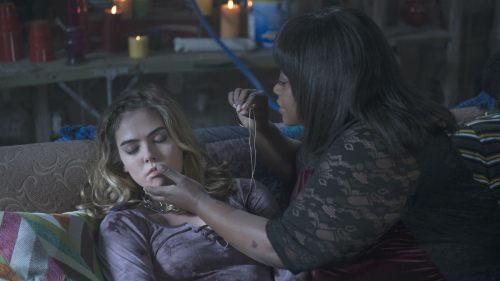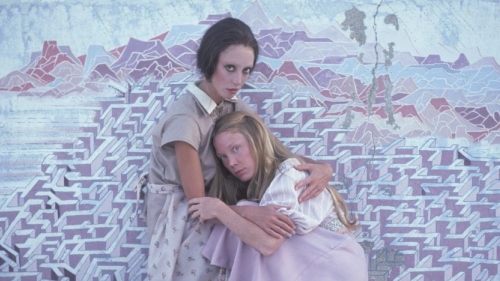With Friends Like These: Re-GIFTing
Ma is out now. Get your tickets here!
A trailer arrives online for a new Blumhouse thriller. The plot involves the protagonists making a new acquaintance, whose presence initially seems benign but soon proves intrusive, then suspicious, then positively troubling, and finally decidedly dangerous. The engine of the story is a friend our guys wish they’d never made. The person you wish you’d never invited into your life.
It’s February 2019, and the trailer is for Ma.
It’s also April 2015, and the trailer is for The Gift.
Obviously The Gift wasn’t the first film to play with that trope. Back in the '90s we called these "From Hell" movies - not because of the Hughes Brothers/Alan Moore/Johnny Depp/Jack the Ripper farrago, but because they’re about the one night stand from hell (Fatal Attraction), the tenant from Hell (Pacific Heights), the cop from Hell (Unlawful Entry), the nanny from Hell (The Hand that Rocks the Cradle), the roomie from Hell (Single White Female), the Robert De Niro From Hell (The Fan, Cape Fear), and so on.
Ma appears to be the crazy inappropriate party-enabling sorority aunt from hell. It may well be that there’s more to it than that, but even if it radically departs from the From Hell playbook it can’t be much more of a rug-pull than The Gift, which ends with us rooting for the apparent antagonist.
This isn’t a thing that happens, even when it feels like it ought to. Fatal Attraction’s misogyny has been well documented: the only person the attraction is actually fatal to is Glenn Close. We can read ambiguity into it, and decide we don’t really sympathise with Michael Douglas, but essentially the film wants you to root for him and cheer when Close is having a good old die in the bath.
The Gift did something different. From the off, it’s hard to like the affluent couple, Simon and Robyn, played by Jason Bateman and Rebecca Hall: the latter brittle and the former playing against his Arrested Development/Horrible Bosses type (as he occasionally, profitably does) as a buttoned-down callous asshole. But we give them the benefit of the doubt. They’ve moved into their modernist new home in the hills of LA for a new start after a miscarriage. They’re not doing well, but they’re hoping to get better. Maybe we’ll warm to them. Writer–director Joel Edgerton shows up as Gordo the Weirdo, and he’s awkward and unwelcome and a little intrusive. Simon and Robyn don’t deal with him well. It’s a difficult situation and maybe we wouldn’t have handled it any better ourselves. But we feel sorry for Gordo. We empathise and sympathise with him, even when he’s trying too hard, or being evasive, or outright lying.
That’s not how this is supposed to go. The formula is being followed: the outsider is throwing spanners in the works, exposing the flaws in the foundations of Simon and Robyn’s relationship, exploiting their insecurities, mischievously putting them off balance. And yet somehow, it still feels like Gordo is the victim here: a suspicion realised as Hall’s sleuthing starts to reveal the back story between Simon and Gordo, and the specifics of the "bygones" Gordo has mentioned. They’re not pleasant, and they tilt the sympathy balance further in the atypical direction. There can only be one protagonist, but it isn’t clear who that is. The script is structured so that it feels like it should be Simon. But the story is one of revenge against a bully, perhaps a lifetime in the planning. What on one hand seems like an insidious campaign of victimisation by Gordo against Simon, is actually a cathartic payback for an insidious campaign of victimisation by Simon against Gordo two decades ago: and the prior events are worse because they’re unprovoked, thoughtless, just kids being mean for no reason. And it worked out for Simon: he’s using the same strategy right now to earn a promotion. Late on we meet PJ Byrne as Danny, Simon’s most recent victim: perhaps another Gordo in the making. He’s responsible for a great jump scare threatening a home invasion, but again, we’re soon reminded that the monster is already inside the house.
Gordo’s ultimate revenge - the ultimate Gift of the title (although there are many that could refer to) is queasy, in that it reduces Robyn to an object to be horrifically manipulated as a revenge pawn – but the movie leads us to believe that didn’t really happen. It’s just Simon’s punishment to believe it did. In the end, Gordo effectively rescues Robyn from Simon’s control. Like Harry, he was here to help. Kind of. Gordo, simultaneously pro and antagonist, doesn’t get a spectacular demise to usher in the credits. He leaves Simon in pieces instead. The film we thought was about the old schoolfriend from hell turns out to have been just that, but we’re not sure whether the friend in that description is Simon or Gordo: the gauche slacker from hell, or the enabled yuppie from hell. It’s both, and ultimately the result is mutually assured destruction. The toxic relationship from hell. All of these movies are about that after all.



